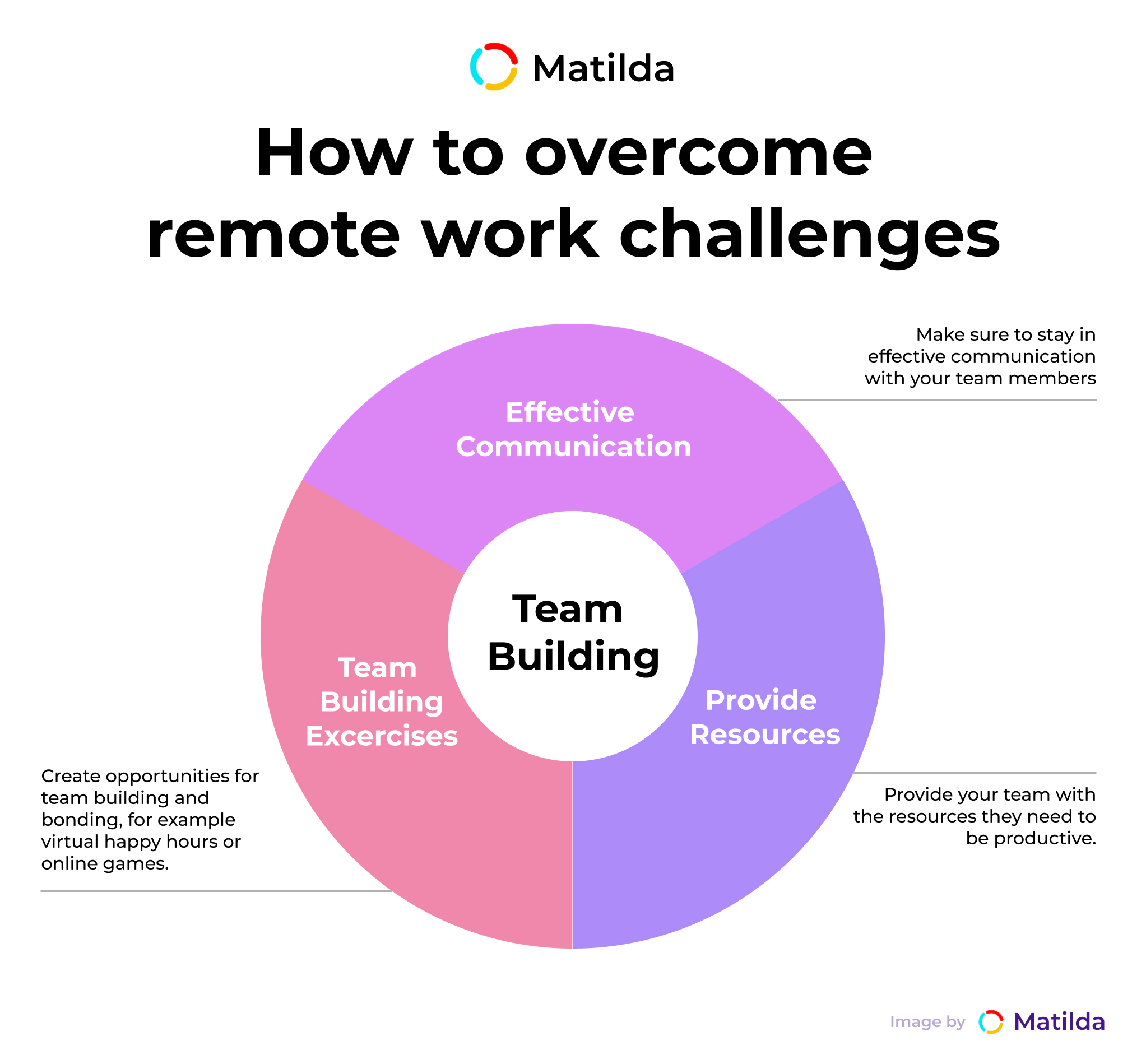If you’re reading this, there’s a good chance you’re the manager of a team (or several teams). Congratulations 👏!
You have one of the most critical jobs in the world. But with great power comes great responsibility – and also, a lot of work.
So how can you make sure your team management skills are as high as possible?
Well, look no further: I’ve got some tips for you. Effective team management doesn’t have to be complicated – keep reading the blog and you’ll be on your way to success!
Chapters
Filters
Chapter 1
Team Management
What is team management?
Team management is the process of organizing and coordinating a group of people in order to achieve a common goal.
This involves everything from setting goals 🎯 and objectives to delegating tasks, providing feedback, and more. Team management can be a lot of work. You have to keep track of everyone’s schedules, make sure everyone is on the same page, and keep everyone organized.
But it can also be a lot of fun. You get to work with a group of people to accomplish something great. And, at the end of the day, you get to feel like a hero. It’s basically herding cats. But it’s also one of the most rewarding things you can do.
What makes an excellent manager?
An effective manager is someone who can get the best out of their team. They are able to motivate and inspire others to achieve their team goals. They’re also good at communicating and delegating individual tasks.
But what really makes an excellent manager is someone who can make employees feel like they’re a part of something bigger.
Someone who can make the workplace fun and motivate, while still getting the job done. A good manager is also able to take feedback and use it to improve their own performance.
Finally, a great manager is someone who is always learning and growing in their role. They are constantly seeking out new ways to improve their skills and knowledge.
Chapter 2
Team Management Benefits
Why is effective team management critical?
There are a few reasons why effective team management is so critical.
First, it helps to ensure that every person on the team is working towards the same goal. If every person is working on their own thing, then it’s going to be very difficult to achieve anything.
Second, effective team management helps to boost employee morale and motivation. It helps them to be more likely to be motivated and enthusiastic about their tasks.
Third, it helps to increase productivity. When everyone is organized and knows what they need to do, they can focus on their task and get things done more quickly and efficiently.
And finally, effective team management helps to create a more positive workspace for the team and they are more likely to feel happy 😀 and satisfied with their job.
Chapter 3
Team Management Skills Tips
How to Achieve Effective Team Management Skills
 There’s no doubt about it, team management skills are essential for any leader who wants to be successful. But how do you acquire these skills? Well, there’s no one-size-fits-all answer, but there are some tips that can help.
There’s no doubt about it, team management skills are essential for any leader who wants to be successful. But how do you acquire these skills? Well, there’s no one-size-fits-all answer, but there are some tips that can help.
First, start by observing how other team managers operate. See what techniques they use to get their team members to work together effectively. Then, try to mimic those techniques in your own leadership style.
Second, don’t be afraid to ask for help. If you’re not sure how to handle a particular situation, reach out to someone who does. Chances are, they’ll be more than happy to offer their advice.
Finally, remember that practice makes perfect. The more you experiment with different team management techniques, the better you’ll become at using them effectively. So don’t be afraid to experiment and learn from your mistakes. With a little effort, you can develop the team management skills that need to be a successful leader.
I’m sure at one point or another we’ve all been in a situation where it feels like we’re managing a team of toddlers. They’re constantly distractible, Temperamental, and refuse to follow directions no matter how many times we repeat them. It seems like every step forward we take is inevitably followed by two steps back.
Luckily, there are some things that we can do to help improve our team management productivity.
Check out these 28 tips for effective team management below!
1. Communicate directly and transparently
 One of the most important things you can do as a manager is to use your communication skills to communicate directly and transparently with your teams. This means being clear about expectations, goals, and deadlines. It also means being open and honest about any challenges or obstacles that the teams may be facing.
One of the most important things you can do as a manager is to use your communication skills to communicate directly and transparently with your teams. This means being clear about expectations, goals, and deadlines. It also means being open and honest about any challenges or obstacles that the teams may be facing.
Your team will be more effective if every person knows what the end goal is. Make sure to communicate these goals clearly and regularly.
Pro Tip
2. Offer a clear vision
In order to achieve team’s success, your team needs to have a clear vision 👀 and strategy. This means that you need to be able to articulate what the team’s goals are and how you plan on achieving them. Without a clear vision and strategy, it will be very difficult for the team to stay focused and motivated.
Be sure to share your vision and strategy with the team on a regular basis. This will help everyone to focus and work towards the same goal.
3. Encourage team collaboration as a team leader
Effective team management skills require that you foster a spirit of team work among your team members. It is one of your responsibilities to encourage collaboration, team building, and idea-sharing and provide opportunities for team bonding.
When team members feel like they are part of a cohesive unit, they will be more likely to work together effectively.
4. Delegate jobs to the right people
Don’t try to do everything yourself!
Utilize the strengths of your other team members by delegating the tasks accordingly. This will make the team more efficient and help everyone feel like they’re contributing.
Delegating tasks to the right people will help to ensure that they are completed efficiently and effectively. When delegating the tasks, make sure to consider each person’s strengths and weaknesses to avoid confusion and frustration.
5. Provide constructive feedback and recognition
Make sure to provide both positive and negative feedback in a constructive way. This will help the teams to learn from their mistakes and continue improving. Additionally, make sure to recognize individual team members’ accomplishments.
Giving feedback is an important part of good management.
However, it’s also important to make sure that the feedback is constructive. For example, instead of saying “you’re doing it wrong,” try “here’s how you could do it better.”
6. Overcome remote work challenges
If your team is remote, there are some additional challenges that you need to be aware of. Make sure to stay in effective communication with your team members, and provide them with the resources they need to be productive.
 Additionally, try to create opportunities for team building & bonding, even if it’s just through virtual happy hours or online games. For example, you could have a remote team-building activity where everyone has to build the tallest tower out of playing cards.
Additionally, try to create opportunities for team building & bonding, even if it’s just through virtual happy hours or online games. For example, you could have a remote team-building activity where everyone has to build the tallest tower out of playing cards.
7. Be an effective communicator
 This one may seem obvious, but it’s worth mentioning. In order to be an effective team manager, you need to be an effective communicator. This means being clear, concise, and organized in your communication skills.
This one may seem obvious, but it’s worth mentioning. In order to be an effective team manager, you need to be an effective communicator. This means being clear, concise, and organized in your communication skills.
Additionally, make sure to listen to your team members and take their needs and concerns into account.
8. Leverage individual skills
Each team member has their own unique skills and strengths. As good managers, it’s your job to identify these strengths and utilize them to the team’s advantage
For example, if you have a team member who is especially good at decision making, make sure to utilize their skills when the team is facing a challenge.
9. Lead by example
The best way to inspire your team is to lead by example. This means being punctual, professional, and respectful. Additionally, make sure to lead by example when it comes to working ethics and completing team tasks in your organization.
If you want your team to be productive, you need to set examples. Show them that it’s possible to balance a strong work ethic with a healthy personal life.
10. Become active listeners
In order to be an effective team leader, you need to be a good listener. This means being open to new ideas and willing to change your plans if necessary.
Listening is an important part of being an effective leader.
Additionally, make sure to listen to your team’s concerns and feedback.
Make sure that you are really listening 👂 to your team members, and not just waiting for your turn to talk.
11. Use Meeting Intelligence & Productivity Tools
There are a number of meeting intelligence and productivity tools available that can help you to be a more effective team manager. Some of these tools include:
- Meeting minutes template
- Team calendar
- Meeting scheduler
- Team chat tool
- Team to-do list
Using meeting intelligence and productivity tools can help you to save time and be more organized. Additionally, these tools can help to improve team communication and collaboration.
12. Hire the Right People
Hiring the right team members is essential for effective team management plans. Make sure that you spend enough time on the hiring process 🤝, and don’t be afraid to ask for help from a professional recruiter if necessary.
It’s also important to make sure that you are hiring for diversity. A diverse team will bring different skills and perspectives to the table, which can be a major advantage to your professional development as well.
When you’re hiring new team members, it’s important to take your time and find the right fit.
Note
13. Equip your team member with proper skills
 Once you have hired the right team members, it’s important to equip them with the proper skills. This means providing training on things like:
Once you have hired the right team members, it’s important to equip them with the proper skills. This means providing training on things like:
- Team communication
- Conflict resolution
- Time management
- Goal setting
Giving your team members the skills they need to be successful will set them up for accomplishments and make your job as a manager easier.
14. Encourage a positive work-life balance
It’s important to encourage a positive work-life balance for your team members. This means creating an environment where it’s okay to take breaks, step away from work for personal time, and have a life outside of work.
When team members feel like they have a good work-life balance, they are more likely to be productive and engaged. Additionally, they are less likely to experience burnout.
15. Offer opportunities for employees and the organization alike
Make sure to offer opportunities for employees and the organization to give and receive feedback. This can be done through regular one-on-one meetings, team meetings, or an anonymous feedback tool.
Giving and receiving feedback is an important part of effective team management.
It helps to ensure that everyone is on the same page and that everyone is aware of areas that need improvement to progress to be a successful team.
16. Keep your staff as happy and engaged as possible
Make sure to keep your staff happy and engaged by offering things like:
- Competitive salaries
- Benefits and perks
- Opportunities for career growth
- Flexible work schedules
When employees are happy and engaged, they are more productive. Additionally, they are less likely to look for other job opportunities.
17. Manage conflict
Conflict is inevitable in any team. However, it’s important to manage conflict effectively in order to avoid negative consequences. Some tips for managing conflict include:
- Encouraging open communication
- Promoting respect
- Listening to both sides
- Offering mediation
If you can manage conflict effectively, it will make a positive impact & actually lead to a more productive and cohesive team.
18. Consider building a culture of encouragement
Encouragement is a powerful tool that can help to motivate and engage team members. Try to build a culture of encouragement in your team by:
- Recognizing and celebrating successes
- Giving constructive feedback
- Showing appreciation
Encouragement can help to develop a positive and productive team environment.
19. Keep in touch with staff and customers regularly
Good communication is essential for any team, whether it’s a group of friends, co-workers, or family. A clear understanding between staff and customers helps to prevent misunderstandings and ensure that the entire team is on the same wavelength.
Additionally, regular communication can help to build relationships and foster a sense of community. Of course, this doesn’t mean that you need to be in constant contact with everyone; simply checking in from time to time can make a world of difference.
So if you’re looking to improve your leadership style, make sure to keep the lines of communication open.
20. Manage Time Wisely
 One of the most important things you can do as a manager is to manage your time wisely. This means learning to prioritize, delegate, and stay organized.
One of the most important things you can do as a manager is to manage your time wisely. This means learning to prioritize, delegate, and stay organized.
If you can master the art of time management, it will make your job as a manager much easier and more effective.
21. Establishing and Maintaining Trust
Trust is essential for any team. Without trust, it’s difficult to build relationships and achieve common goals. As a manager, you can help to establish and maintain trust by:
- Being honest and transparent
- Keeping your word
- Communicating regularly
- Behaving consistently
If you can build trust within your team, it will lead to a more positive and productive environment.
22. Celebrate Wins
Make sure to celebrate successes, both big and small. This will help to motivate and engage employees. Try to celebrate wins in a way that makes everyone feel included and appreciated.
Some ideas for celebrating wins include:
- Having a team lunch or happy hour
- Giving out awards or prizes
- Hosting a company-wide celebration
When you take the time to celebrate successes 🥂, it shows your team that you are invested in their success.
23. Practicing Consistency
Consistency is important for teams. When team members know what to expect, it helps to create a sense of stability and predictability. As a manager, you can help to foster consistency by:
- Creating clear policies and procedures
- Communicating expectations clearly
- Behaving predictably
If you can be consistent in your leadership style, it will go a long way in creating a positive and productive team environment.
24. Encouraging Innovation
Encourage your teams to be creative and think outside the box💡. This will help to keep everyone engaged and motivated. Additionally, it will help the team to come up with new and innovative solutions to solve problems. Few ways to encourage innovation include:
- Encouraging open discussion
- Brainstorming sessions
- Rewarding creativity
If you can encourage innovation in your team, it will lead to more achievement in the long run.
25. Establish processes to manage projects & productivity
If you want your team to be productive, you need to establish clear processes for managing projects. This will help everyone to stay organized and on track. Additionally, it will make it easier to identify areas that need improvement.
 Some tips for establishing project management processes include:
Some tips for establishing project management processes include:
- Defining roles and responsibilities
- Creating clear timelines
- Setting milestones
By establishing clear processes, you can help to ensure that your team is productive and efficient.
26. Verify the Strengths and Weaknesses of all Team Members
In order to direct your teams effectively, you need to know the strengths and weaknesses of each employee. This will help you to assign daily tasks appropriately and give everyone the opportunity to shine.
One way to assess the strengths and weaknesses of your team members is to conduct regular performance reviews. This will give you a chance to provide feedback and identify areas for improvement to progress.
Additionally, you can also ask team members to complete a self-assessment. This can help to give you a more well-rounded view of each person’s strengths and weaknesses.
Regularly assessing the strengths and weaknesses of your team members will help you to track progress and better understand how will your team perform effectively.
27. Use a set of Rules as a working Paradigm
There are a lot of effective managers out there who use a set of rules as a working paradigm for team management. In fact, it’s become quite a popular trend. And why wouldn’t it be?
After all, when you develop a set of rules to follow, it makes things a lot easier. No more worrying about whether or not you’re doing something right or wrong. Just follow the rules and you’ll be fine.
Of course, there are always going to be exceptions to the rule. But that’s no reason not to use a set of rules as a general guideline for managing your teams.
After all, good team managers know that the key to success is being flexible and adaptable. And what better way to show that than by using a set of rules as your foundation? So go ahead and give it a try. You might just find that it makes your job a lot easier.
28. Avoid Putting Pressure on the Team
In any work environment, it’s important to avoid putting pressure on the team. When employees feel like they’re constantly being watched or judged, it can lead to increased stress levels and feelings of anxiety.
This, in turn, can lead to lower productivity and a decrease in overall morale. Instead, try to create an environment where employees feel like they can relax and be themselves. Encourage open communication and collaboration, and be sure to give employees the freedom to experiment and make mistakes.
By creating a healthy workplace culture, you’ll ultimately have a more productive and successful team.
Developing team management skills is essential for any team leader looking to take their team to the next level. By following these tips, you’ll be well on your way to success.


